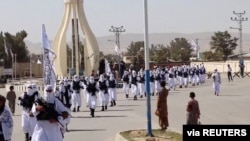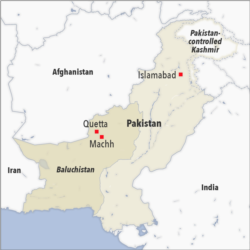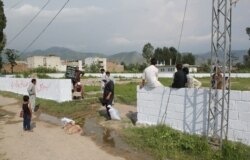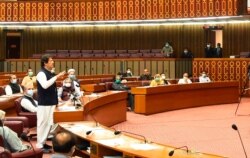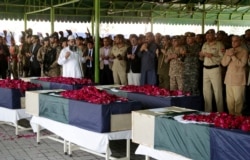Pakistan’s Prime Minister Imran Khan was quick last week to endorse the Taliban’s seizure of power in Afghanistan, praising the militant group, which was nurtured by Pakistan’s intelligence services from birth according to Western security assessments, for breaking the “shackles of slavery.”
And on Tuesday, Pakistan seemingly got in return a prize, say Western security officials: the appointment by the Taliban of former Guantanamo detainee Abdul Qayyum Zakir as Afghanistan’s acting defense minister.
His appointment was first reported by Al Jazeera.
A legendary battlefield commander who posed as a low-ranking militant conscript while an inmate in American custody, Zakir is seen as an ally of the leaders of the Haqqani network, a Taliban sub-set, which has close ties with foreign jihadist groups. He aligned reportedly with Haqqani leaders in opposing the Taliban opening peace talks with the Afghanistan government of President Ashraf Ghani, preferring to wage jihad until victory was won.
Zakir is well known to Pakistan’s Inter-Services Intelligence agency, ISI, which is believed to have arranged for his quick release from custody after being arrested in 2010, along with nine other Taliban leaders, in Quetta, the capital of Pakistan’s Baluchistan province.
Thereafter, Zakir, then 38-years-old, directed Taliban military operations over the border in Afghanistan, largely in Helmand province, according to Western security officials, and he was able to cross freely back and forth across the border directing an insurgent surge, which included roadside and suicide bombings targeting NATO soldiers.
To the exasperation of Washington, Pakistani declared Baluchistan province off-limits for American drone strikes, and Western security officials say ISI gave Zakir and the Taliban free rein. A senior Pakistani politician told Newsweek magazine in 2011: “They are coming and going in groups without end. Whatever the Taliban is doing is supervised and monitored by the [Pakistani] intelligence agencies.”
Double game
Western officials have long argued ISI has been playing a double game in the war on terror, one that was advertised to the world when al-Qaida founder Osama bin Laden was discovered by the U.S. hiding in a house near Pakistan's premier military academy.
President Obama revealed publicly after he left office that he ruled out involving or informing Pakistan of the raid on bin Laden's hideout because it was an “open secret” that certain elements inside Pakistan's military, and especially its intelligence services, maintained ties with the jihadists, sometimes using them as strategic assets against India and regionally.
In 2018, the Trump administration stopped military aid to Islamabad, accusing Pakistan of failing to take action against the Taliban. Pakistan denied harboring terrorists.
Zakir’s pick as defense minister is being cited as another example of how the Taliban’s seizure of power in Afghanistan is for Pakistan a geopolitical victory. Pakistan’s ISI trained Taliban founder Mullah Omar during the war against Russia in the 1980s and he was treated in Pakistan for wounds he sustained on the battlefield.
India’s former Ambassador to Kabul, Gautam Mukhopadhaya, dubbed Monday the Taliban’s victory a “Pakistani invasion with an Afghan face.”
“Pakistan has long played a critical, yet confusing role in Afghanistan,” according to Muhammad Nadeem Malik, a professor at Australia’s University of Melbourne. “It has been one of the strongest U.S. allies in its ‘war on terror,’ yet it has also covertly backed the Taliban in its fight against U.S.-led forces for years,” he added in a commentary for The Conversation, an online discussion platform.
He notes that in 2014 General Hamid Gul, a former ISI head, told a television audience that Pakistan had even used US aid to continue funding the Taliban after the September 11 terror attacks. “When history is written, it will be stated that the ISI defeated the Soviet Union in Afghanistan with the help of America. Then there will be another sentence. The ISI, with the help of America, defeated America,” Gul bragged.
“Pakistan’s biggest gain is that India will lose its influence in Afghanistan,” says Malik. “The Taliban takeover also allows Pakistan to boost its bilateral trade with Afghanistan and provides an unrestricted trade route to the countries of central Asia,” he adds.
Risks
But he and other analysts, such as Bruce Riedel, a former CIA counter-terrorism expert and now at the Brookings Institution in Washington, say the Taliban’s victory could prove problematic for Pakistan and may embolden domestic terror groups within Pakistan, including Tehrik-e-Taliban, otherwise known as the Pakistan Taliban, a jihadist group responsible for killing thousands of Pakistanis civilians and attacking the country’s security forces.
There have been reports that the Taliban has released hundreds of Tehrik-e-Taliban fighters held in Afghan jails, including the group’s former deputy chief Faqir Mohammad.
“The Taliban/ISI victory in Afghanistan will have significant consequences for Pakistan, some of which may be dangerous and violent,” Riedel says. He says it is fair to assume that ISI helped the Taliban plan its military tactics this year, much as it supported its drive on Kabul in 1996, but that there could be blowback for Pakistan, too, from a Taliban victory.
“The Afghan Taliban have a murky relationship with their Pakistani counterpart. Certainly, individuals in the Afghan Taliban are in touch with their Pakistani fellow believers and will offer safe haven in their new conquests,” he said in a commentary for Brookings.




